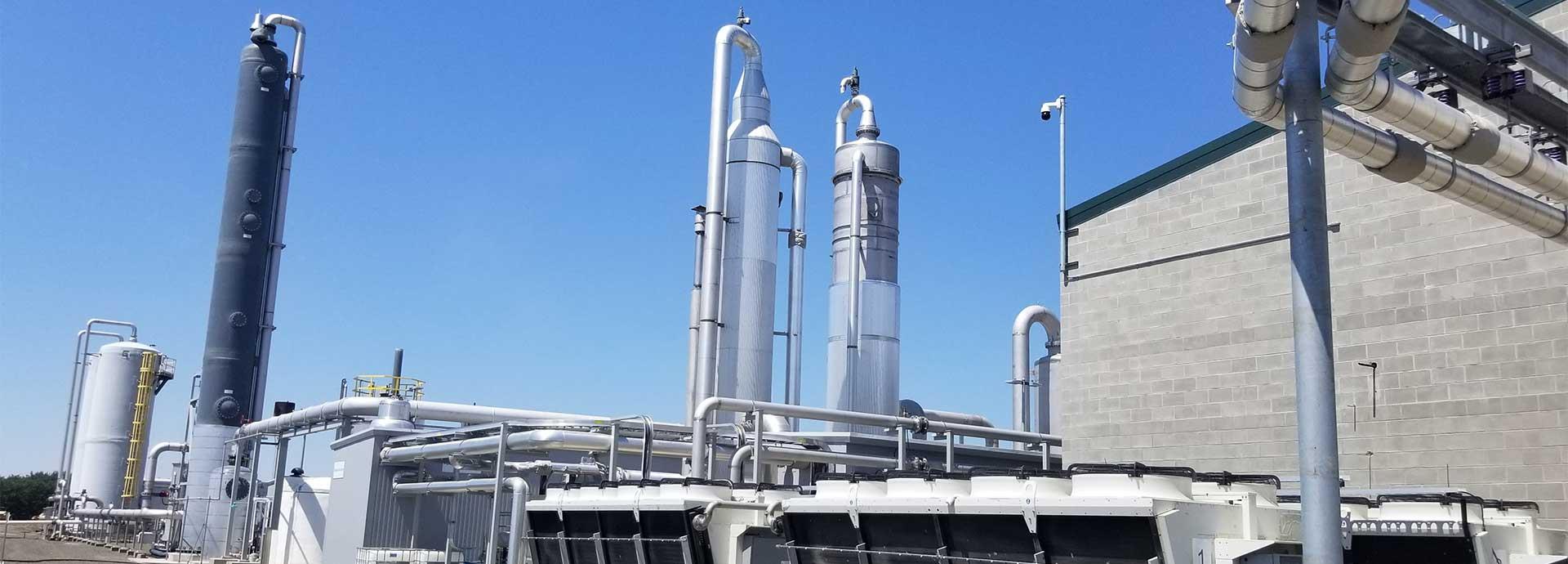

As companies around the world seek to transition to renewable energy, Wärtsilä has delivered a ground-breaking biogas upgrading plant to an agriculture customer in the USA, which converts methane into renewable natural gas.
Threemile Canyon Farms manages some 93,000 acres of farmland in Oregon, USA. The land is used to raise livestock for dairy production and grow conventional and organic crops. A leader in sustainable agricultural practices, Threemile Canyon Farms has always placed care for the environment at the forefront of its operations. Its investment in a biogas upgrading plant, delivered in 2019 by Wärtsilä Biogas Solutions, is the latest in a long line of climate-smart initiatives.
“We’ve operated with an emphasis on farming responsibly and sustainably ever since we took over Threemile Canyon Farms in 1999. As farmers, we take the protection and preservation of our natural resources extremely seriously, because, without them, we’re out of business. And more to the point, it’s the right thing to do,” says Marty Myers, General Manager, Threemile Canyon Farms.
A natural opportunity
It all started in 2016, when they were approached by energy company TransCanada about placing a natural gas pipeline under the farm. Threemile Canyon Farms saw this as an opportunity to start delivering Renewable Natural Gas (RNG).
The decision was made to invest in a Wärtsilä biogas upgrading plant, which uses an existing anaerobic digester (AD) site to produce biomethane. The installation, which was completed in mid-2019, encompassed equipment for gas conditioning and compression for pipeline injection, as well as the supply and installation of a biological hydrogen sulphide removal system.
Fast forward to 2020 and the now fully operational plant is expected to sequester around 136,000 metric tonnes per year of CO2. This is equivalent to the annual greenhouse gas emissions from 28,875 passenger vehicles, or CO2 emissions from the energy consumption of 16,285 homes.
The plant uses the methane from the animal manure produced on the dairy farm to generate sustainable RNG. The RNG is injected into TransCanada’s pipeline, which feeds into the regional power grid.
The perfect partner
“Anaerobic digestion helps recycle organic waste, turning it into biogas and valuable soil products, using a natural, biological process. After simple processing, the biogas becomes a renewable substitute for natural gas, and the digested materials can be used as a fertiliser on the farm,” explains Mark Storey, the Wärtsilä Sales and Marketing Manager responsible for the Threemile Canyon Farms project. “Instead of producing waste and harmful emissions, the farm reduces its carbon footprint, secures revenue from the gas sales, and has a valuable fertiliser to spread back on the land.”
Myers admits that Wärtsilä’s long-standing experience in the biogas field made it the obvious choice of supplier.
“One major thing we’ve learned in more than 20 years of operating the farm is that we can’t be experts in everything. That’s why choosing the right partners, the right experts, is critical to success. Wärtsilä seemed the best choice and they have proven their worth on this project,” he says.
“Wärtsilä has extensive experience of similar projects in Europe,” adds Storey. “Our technology is proven to deliver higher methane recovery than any other product, enabling 99.9% of the methane in the raw biogas to be recovered, thereby increasing customer revenues and reducing methane emissions to the atmosphere.”
Building a circular economy
Going forward, RNG will play a key part as Threemile Canyon Farms seeks further to develop its circular economy model.
“Where others might see waste, we see the potential for something positive and useful,” says Myers. “RNG is exciting because it displaces traditional fossil fuel-based natural gas and can also be stored when needed, unlike some other alternative energy sources.”
The American Biogas Council predicts significant growth for the U.S. biogas market over the coming years, estimating that the country has more than 13,500 new sites ripe for development, including 8,241 dairy and swine farms. Its recent study suggests that, if fully realised, these new biogas systems could produce enough energy to power 7.5 million American homes and reduce emissions equivalent to removing up to 15.4 million passenger vehicles from the road. They would also catalyse an estimated USD 40 billion in capital deployment for construction activity, which would result in approximately 335,000 short-term construction jobs and 23,000 permanent jobs to build and run the digesters.
“Creating energy from waste is a win-win for everyone,” says Storey. “I believe renewable natural gas has an important role to play in the next ten years. Along with wind and solar power, it will reduce our reliance on fossil fuels and support the transition to Power to X.”
“I’m thrilled to have been part of the first project to introduce Wärtsilä Biogas Solutions and our technology to North America,” he adds.
“The RNG digester has elevated our regenerative agriculture efforts and outcomes. It takes us to the next level and fits right in with our sustainable and responsible farming philosophy,” concludes Myers.

